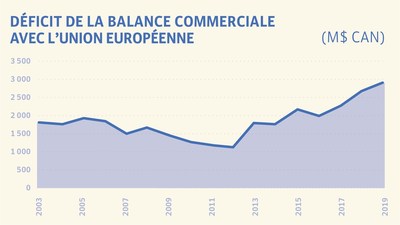Canada NewsWire
MONTREAL, Oct. 9, 2019
MONTREAL, Oct. 9, 2019 /CNW Telbec/ - Oil exportation is the main area where the Canada-European Union Comprehensive Economic and Trade Agreement (CETA) has proved effective. Two years after it came into force, the overall trade deficit between Canada and the European Union (EU) continues to increase. CETA has not lived up to the hopes created when signed by Canada. In a new study published today, IRIS ( Institut de recherche et d'informations socioéconomiques ) analyses import and export data between Canada and the EU.

Two sectors have gained from the CETA, energy (oil) and minerals. 'It is unthinkable that in 2019, the main economic benefits from CETA are related to fossil fuels' comments Guillaume Hébert, an IRIS researcher. 'Commercial development of mineral resources is also in Canada's favour, another highly polluting industry. This is nothing to be proud of. Industries producing the most pollution are the only beneficiaries.' While Canada was a net importer of oil with the EU, it has become a net exporter in the last two years.
Trade deficit with the European Union 2003-2019 (M$CAN)
CETA was to permit Canadian industries, particularly SMEs, to reach new markets. The level of exportation has decreased by 22,1% since signing, equivalent to $323M per month. 'One wonders what other advantages other than those related to energy export Canadian authorities hoped to gain from this agreement. In practically all fields one finds a deterioration of the Canadian trade deficit' explains Guillaume Hébert.
Why sign this type of agreement?
Before 2017, many tariffs were abolished between Canada and its principal economic partners in Europe. Overall benefits of CETA seem marginal for Canada but Guillaume Hébert shows that 'large corporations are winners. One should understand that this agreement sets up a legal framework favoring the operations of transnational corporations. As we have seen in the past, companies can take legal action against Canada if environmental policies adopted are perceived as barriers to commerce. CETA has far reaching results including consequences for democracy.'
About IRIS
IRIS (nonprofit, independent, progressive, the Institute for Socioeconomic Research and Information) was founded in 2000. The Institute produces analyses on important question of the day (public-private partnerships; fiscal policy; education; health; etc.) and publishes alternative positions to points of view defended by economic elites.
Read the article at (in French) : https://iris-recherche.qc.ca/publications/aecg-ceta-2019.
SOURCE Institut de recherche et d'informations socio-économiques (IRIS)

View original content to download multimedia: http://www.newswire.ca/en/releases/archive/October2019/09/c7146.html
Laurent Deslauriers, Public relations officer, 438 862-8051, deslauriers@iris-recherche.qc.caCopyright CNW Group 2019
Source: Canada Newswire
(October 9, 2019 - 7:00 AM EDT)
News by QuoteMedia
www.quotemedia.com







